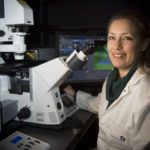Lien vers Pubmed [PMID] – 27502604
Neurogenesis (Austin) 2015;2(1):e1004971
It is widely known that neurogenesis, brain function and cognition decline with aging. Increasing evidence suggests that cerebrovascular dysfunction is a major cause of cognitive impairment in the elderly but is also involved in age-related neurodegenerative diseases. Finding ways and molecules that reverse this process and ameliorate age- and disease-related cognitive impairment by targeting vascular and neurogenic deterioration would be of great therapeutic value. In Katsimpardi et al. we reported that young blood has a dual beneficial effect in the aged brain by restoring age-related decline in neurogenesis as well as inducing a striking remodeling of the aged vasculature and restoring blood flow to youthful levels. Additionally, we identified a youthful systemic factor, GDF11 that recapitulates these beneficial effects of young blood. We believe that the identification of young systemic factors that can rejuvenate the aged brain opens new roads to therapeutic intervention for neurodegenerative diseases by targeting both neural stem cells and neurogenesis as well as at the vasculature.

